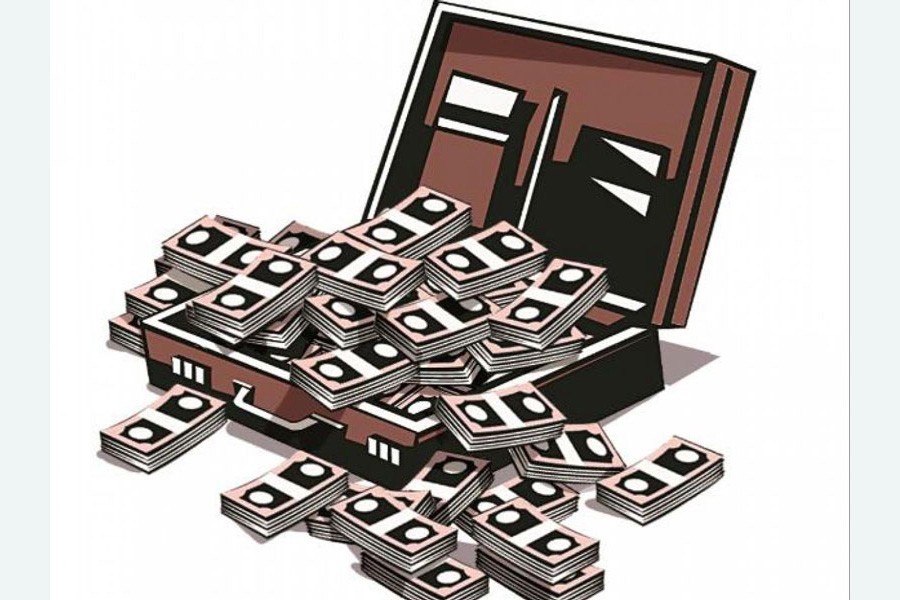Since the government offered a fresh opportunity to legalise the 'undisclosed' - a word deliberately used to hide the true identity of illegally earned funds - money in the budget for the current fiscal year (FY), some business leaders and economists have been critical of it. They have described the provision as a disincentive for the 'honest taxpayers'.
The budget allows legalising the undisclosed money by paying only 10 per cent tax. The tax rates, as high as 25 per cent, enforced on the people paying tax on their lawful income, are not applicable in the case of holders of undeclared funds.
Business leaders and economists have objected to this unfair part of the opportunity offered to the people who have amassed wealth, using the wrong routes.
The heads of two leading chamber bodies at a recent webinar on budget strongly pleaded for discontinuation of the facility in the next national budget. One of them said the provision is 'unjust. Another suggested imposing a 10 per cent penal tax besides normal tax rates if anyone wants to legalise the 'black money'.
Why does the government come up with the offer frequently that all the fair-minded people abhor most? Is it worth the criticism the policymakers have to digest every time?
This year the response to the black money whitening provision has been strong. In the first half of the current fiscal, nearly Tk 100 billion was whitened, and the government earned more than Tk 9.0 billion in taxes. If the trend persists, a record Tk 200 billion is likely to be legalised, leaving tax revenue income between Tk 18 billion and Tk 20 billion at the end of the current fiscal. The finance minister is enjoying the response from the black money holders.
The primary reasons for an increased number of people coming forward to legalise their tainted money this year could be the imposition of a nominal rate of tax and the guarantee that none would ask any question about the source of funds. The second provision - indemnity - probably, has played the key role. Another factor should not be missed. The pandemic has made it rather difficult for many to transfer illegal money abroad. A part of that fund might have sneaked into the economy availing the money-whitening provision.
The economists and business leaders have termed the budgetary provision biased against the honest taxpayers. But does such a section incorporated into the finance act encourage corruption and financial irregularities in society?
When no question is asked by any agency, be it the revenue board or the anti-graft entity, there should be no reason for the corrupt elements not being bold for legalising their unearned income. Certainly, there is a link between corruption and tax amnesty, given in any form.
What guided the policymakers to be sympathetic towards the holders of black money is not that much clear.
Do they want an extra amount of tax revenue or bring in hidden cash into the economy or both?
People would know the volume of money whitened, and the tax realised on that account at the end of the current fiscal. It would be, however, fair, on the part of the authorities, to inform the people about the sectors where the tainted money being invested. Hopefully, the finance minister would give details in his upcoming budget speech.
It is necessary to assess the impact of such a soft approach towards the black money holders on the graft situation in the country.
None knows for sure the actual size of the country's black or grey or underground economy. The finance ministry some years back carried out a survey to know its size. But, the finding was not a definitive one. The survey estimated the size between 44 per cent and 80 per cent of the country's gross domestic product (GDP). However, a multilateral institute in 2018 estimated the size of the black economy at 30 per cent. Even that is huge. According to the World Bank estimate, the GDP was worth US$274 billion in 2018. In that case, the black economy was equivalent to US$82 billion. This economy has grown bigger by the day because of the continuous addition of money earned through corrupt means.
In a country where corruption is systemic and endemic, it is natural that the black economy would continue to expand.
How is the state of corruption? Has the menace been on the decline? Many tend to believe that the opposite has happened. It is not that only the incidence of graft-taking and financial irregularities has gone up in recent years, the volume of money involved in those has also been huge. The anti-graft body has remained more of a non-entity as far as curbing corruption in society is concerned. In such a situation, the size of the black economy will continue to grow and its key players will always appreciate the facility to whiten the tainted money.


